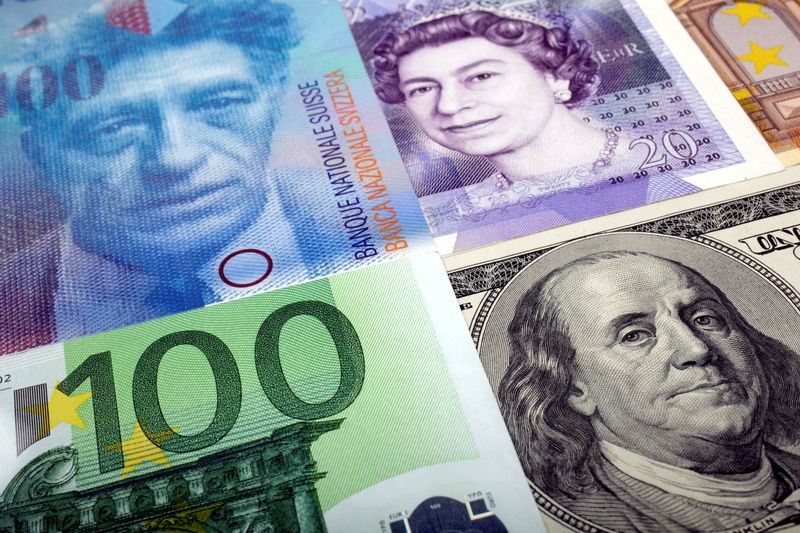By Jamie McGeever
ORLANDO, Florida (Reuters) - What if Japan or China intervened in the foreign exchange market to sell dollars and support their currencies and liquidated U.S. Treasuries in the process - and the sky didn't fall down?
It would be a scenario hard to imagine even 10 years ago, but it's more plausible now because the world's top two holders of U.S. debt no longer pack the Treasury market punch they once did - either individually or even together.
The Japanese and Chinese central banks' combined footprint in the world's largest, deepest and most liquid government bond market is now its lowest on record, at least since comparable data began being collected in the late 1990s.
Their combined $2 trillion pile in June, the last month official U.S. Treasury data is available, equated to 7.8% of the $25 trillion outstanding marketable U.S. Treasuries, less than a third of the record 25.4% registered in June 2007.
Japan's official stash of $1.11 trillion represents 4.4% of the total market, also a record low, while China's $835 billion stash is around 3.4% of the total, the lowest in over 20 years. In contrast, the Federal Reserve holds $5 trillion, or 20% of the overall market.
To be sure, Japan and China are still forces to be reckoned with. They are by some distance the world's top two holders of U.S. bonds, and China's stash is probably significantly larger when state banks, wealth funds and suspected holdings in third-party countries like Belgium and Britain are factored in.
But they don't bestride the Treasuries market like they once did, nor does the threat of them selling strike the same fear into bond investors, global markets at large, and even policymakers in Washington.
That wasn't the case in years gone by, certainly in the 2000s before the global financial crisis when Japan, oil exporters and emerging countries - especially China - recycled their huge trade surpluses into U.S. Treasuries to build up formidable foreign exchange reserves.
"No foreign central bank owns the bond market, so to speak. The market is basically driven by a set of bets on the Fed, not flows from any one country these days," said Brad Setser, senior fellow at the Council of Foreign Relations.
BRINGING UP THE REER
Japan and China were both buyers of Treasuries in June, the last month of available data. Valuation-adjusted data from Fed economists Carol Bertaut and Ruth Judson show that China and Japan added $8 billion and $6 billion to their respective stashes.
China's Treasuries holdings fell a valuation-adjusted $34 billion in the first half of the year, although its U.S. agency debt holdings rose nearly $20 billion. Japan's Treasuries stash increased by $40 billion while its agencies pile fell by $25 billion.
Foreign central banks' total stockpile of Treasuries rose $26.5 billion to $3.54 trillion in June, and by almost $100 billion in the first half of the year, Judson and Bertaut's figures show.
This ties in with official sector holdings of U.S. Treasuries parked with the Fed, which are up around $100 billion this year.
That's a lot, but nowhere near keeping pace with the increase in supply. The Fed continues to reduce its holdings by $60 billion a month, and U.S. Treasury issuance is exploding.
With U.S. bond yields at their highest since the late 2000s, the widening yield gap is pushing the yuan and yen to historically low levels against the dollar. The yen's real effective exchange rate, or REER, is also near its lowest in 50 years, and the yuan's REER value is the lowest in a decade.
Speculation is rising that Beijing or Tokyo could soon dip into their Treasuries holdings to fund dollar-selling intervention in the currency market.
Tokyo is more likely to take the plunge, as it did last September and October. Its rounds of yen-supporting interventions were worth a record $60 billion and funded mostly via U.S. T-bills or short-dated bonds.
Chinese state-run banks, meanwhile, are mopping up excess yuan to keep the exchange rate "basically stable at a reasonable and balanced level" and Beijing has other liquidity-boosting and exchange rate-management tools to steady the currency without selling Treasuries.
At least for now.
"We do not yet see signs of Treasury sales for intervention purposes, but further dollar appreciation particularly vs the yuan and yen pose risks," Bank of America (NYSE:BAC) strategists wrote last week.
(The opinions expressed here are those of the author, a columnist for Reuters)
